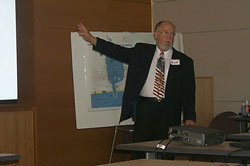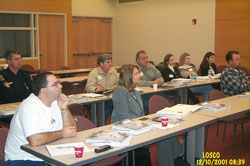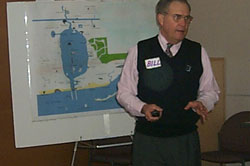Louisiana Oil Spill Response Management Training Program (OSRMTP)
Government and industry personnel who clean up oil spills are called into the field at a moment's notice. To help response personnel prepare for spill emergencies, the Louisiana Oil Spill Coordinator's Office (LOSCO) developed a training course that explains regulations, outlines the latest response techniques, and encourages information exchange between government and industry. The two-day oil spill response management course is offered free in different cities throughout the state. Approximately 200 contractors, government officials, regulators, and others involved in oil spill response management take the training every year. Special workshops for specific, in-depth subjects can be arranged.
The course "presents the information that existing and proposed Minerals Management Service (MMS) Regulations require to be presented to personnel responsible for supervising oil spill response operations."
|
The course is aimed at simulating oil spill incidents within an interactive and participatory environment. Topics covered include:
- Louisiana Environments (Marine, Coastal, and Inland)
- National Response System
- Regulatory Issues
- Response Initiation
- Command Post Organization
- Incident Action Plan Development
- Fate and Effects of Oil in the Environment
- Recovery Decisions
- Cleanup Decisions
- Waste Disposal and Demobilization
- Personal Safety
- Public Affairs
- NRDA (Natural Resource Damage Assessment)
In addition, instructors present information on:
- Specific Case Studies
- Research Findings from Oil
Spill Research and Development Programs
- Current Programmatic and Technological Advances in the Response Industry
- Current Events Associated with Oil Spills
|



|
LOSCO has been sponsoring the Louisiana Oil Spill Response Management Training Program since June 1997. It is offered to those individuals in both the public and private sectors who may become involved in responding to an oil spill. The Oil Pollution Act of 1990 (OPA), 33 USC 2701 et seq. gave the states a role in oil spill response management. The Louisiana Oil Spill Prevention and Response Act of 1991 (OSPRA), La. Rev. Stat. 30:2451 et seq. defined that role. The course is taught from the perspective of the State On-Scene Coordinator (SOSC), to outline the expectations of the state, which parallels the expectations of the federal government and the requirements placed on the Responsible Party.
Approximately 2/3 of all crude oil imported to the United States, from all sources, enters the United States by way of a Gulf of Mexico port (Corpus Christi, Texas to Pascagoula, Mississippi). Recent oil production growth, particularly deep water systems, has increased oil-related activity throughout Louisiana, particularly in coastal areas. During the period 1991 to present, approximately 19% of all oil spills reported to the National Response Center occurred in Louisiana (both coastal and inland). Approximately 21% of the volume of discharges of petroleum products occurred in Louisiana. The juxtaposition of this increased activity and abundant natural resources represents the potential for significant environmental injury from major oil spills.
In March 1989, the Exxon Valdez spill in Prince William Sound, Alaska focused national and worldwide attention on oil spills. As a result, the Oil Pollution Act of 1990 (OPA), 33 USC 2701 et seq. was passed. In spite of the notoriety of the spill, it was a relatively small spill in comparison to spills worldwide, ranking 58th in size. However, the Exxon Valdez spill, if superimposed on coastal waters of Louisiana, would affect coastal Louisiana from the Sabine River to the Pearl River, and would cause major environmental and economic injury.
Since spilled oil spreads rapidly on water and is moved by surface currents and wind, it threatens important and fragile coastal resources. Delays in employing effective and well-planned response measures can result in escalating environmental and economic injury. The sooner responders are mobilized on-scene, the quicker coordinated response measures can be implemented to minimize impacts on coastal resources. In an effort to strengthen the response capability and to create an awareness of oil spill issues in the state, the Louisiana Oil Spill Response Management Training Program was established.
Qualified instructors who are experienced in oil spill response regulations, countermeasures, and management teach the two-day course. In an interactive classroom setting, the course is taught monthly in selected cities throughout Louisiana. In addition, the course is taught in Port Arthur, Texas, in association with the Texas General Land Office. In the event of a spill on the Sabine River or on Sabine Lake, both Louisiana and Texas officials would have response responsibilities to the spill. The first day of classroom instruction sets the stage for class participation in a spill response tabletop exercise. Scenarios involve an offshore as well as an inshore incident in hypothetical coastal areas, with typical coastal structures, features, and natural resources. Similarly, for classes held in inland locations, oil spill scenarios and related activities are representative of inland areas.
Currently Scheduled Classes by Date and Location
No classes scheduled

|